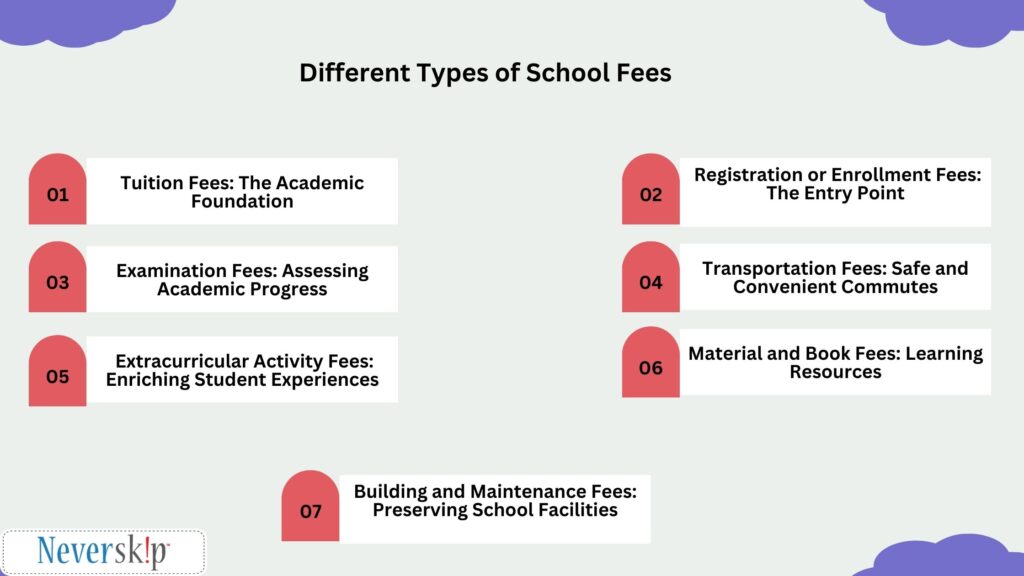Whether you’re a school administrator, a parent, or simply interested in the functionalities of school finance, comprehending the school fee categories is crucial for a multitude of reasons. From enhancing your school’s cashflow management to ensuring transparent financial transactions, knowing the ins and outs of school fees is a fundamental step towards effective financial governance.
In this blog, we will walk you through the different school fee types, their significance and the pivotal role they play in the educational ecosystem. Additionally, we will explore the importance of implementing a robust fee management system to streamline and optimize the fee collection process, ensuring both schools and parents can navigate this financial terrain with ease and efficiency.
This exploration will provide invaluable insights into the world of school fees and the transformative potential of efficient fee management systems. So, let’s get started!
What Does a School Fee Type Means?
In the context of educational institutions, a “school fee type” refers to a specific category or classification of fees that students, parents, or guardians are required to pay to cover various educational and operational expenses associated with attending a school.
These fees are typically structured to ensure the seamless functioning of the school and the provision of essential services, resources, and facilities to students. Understanding the different school fee types is crucial for both school administrators and parents, as it contributes to transparent financial management and planning.
What are the Different Types of School Fees?

The financial landscape of educational institutions is multifaceted, and understanding the various types of school fees is essential for both school administrators and parents. Each fee type serves a distinct purpose of WhatsApp group for students and contributes to the overall functioning and quality of education provided by the school.
Let’s delve into the diverse categories of school fees.
1. Tuition Fees: The Academic Foundation
Tuition fees form the backbone of a school’s revenue stream. They cover the cost of academic instruction, including teacher salaries, classroom resources, and educational materials. These fees are typically paid on a regular basis, such as monthly, quarterly, or annually, depending on the school’s fee structure format. Tuition fees vary widely between institutions and are often influenced by factors like grade level, curriculum, and location.
For parents, understanding the breakdown of tuition fees is crucial for budgeting their child’s education expenses. A fee management system can help schools provide detailed fee statements, making it easier for parents to track payments and apply for fee dues if necessary.
2. Registration or Enrollment Fees: The Entry Point
Registration or enrollment fees are one-time payments required during the initial admission process. These fees cover administrative costs, such as processing application forms, conducting entrance tests, and maintaining student records. Unlike tuition fees, registration fees are non-refundable and are paid when a student first joins the school.
Clear communication regarding registration fees is vital to ensure transparency in the admission process. Schools often provide a fee structure format that outlines all applicable fees, including registration fees, to avoid any surprises for parents.
3. Examination Fees: Assessing Academic Progress
Examination fees are charges levied to cover the expenses associated with conducting examinations. These fees encompass various components, including the printing of test papers, hiring invigilators, and the grading process. They are typically paid before the commencement of major exams, such as midterms and finals.
Efficient fee management systems can simplify the collection of examination fees, ensuring that students are registered for exams and that the funds are allocated appropriately to support the examination process.
4. Transportation Fees: Safe and Convenient Commutes
Many schools offer transportation services, such as buses or vans, for students who need to commute to and from school. Transportation fees are collected to cover the costs of operating and maintaining these vehicles. The amount may vary depending on factors like the distance traveled and the frequency of transportation.
Providing a clear fee structure format for transportation fees helps parents understand the costs involved and make informed decisions about whether to opt for school-provided transportation or arrange alternative means of commuting.
5. Extracurricular Activity Fees: Enriching Student Experiences
Extracurricular activity fees are associated with the participation of students in clubs, sports teams, cultural events, and other non-academic activities. These fees may encompass expenses like uniforms, equipment, competition fees, and event-related costs. They are essential for fostering a well-rounded educational experience and allowing students to explore their interests beyond the classroom.
Schools should maintain transparent fee structures for extracurricular activities, ensuring that parents are aware of the costs and can make informed choices regarding their child’s involvement in these activities.
6. Material and Book Fees: Learning Resources
Material and book fees are charges associated with textbooks, workbooks, stationery, and other learning materials provided by the school. These fees ensure that students have access to the necessary educational resources to support their studies.
Efficient fee management systems can help schools streamline fee processing, the distribution of materials and ensure that students receive the required resources in a timely manner. Additionally, providing a fee structure format for material and book fees helps parents plan for these expenses at the beginning of the academic year.
7. Building and Maintenance Fees: Preserving School Facilities
Building and maintenance fees are collected to fund the upkeep and improvement of school facilities, including classrooms, laboratories, libraries, and sports facilities. These fees contribute to creating a conducive learning environment for students by ensuring that school infrastructure remains in good condition.
Schools should maintain transparency in their fee structures by clearly specifying the purpose of building and maintenance fees. Parents and guardians can then appreciate the importance of these fees in preserving and enhancing the school’s physical infrastructure.
The Role of a Fee Management System in Fee Administration
A fee management system plays a pivotal role in facilitating the effective administration of various school fees. Here are some key functions of such a system:
- Fee Tracking: A fee management system allows schools to track payments, outstanding balances, and fee histories for each student. This transparency benefits both schools and parents by ensuring that fees are paid on time and providing a clear record of financial transactions.
- Customization: Schools can customize fee management systems to accommodate their specific fee structure format, allowing for flexibility in fee types, amounts, and payment schedules.
- Communication: These systems enable efficient communication between schools and parents regarding fee-related matters. Schools can send fee statements, payment reminders, and notifications about fee dues through the system, ensuring that important information reaches parents in a timely manner.
- Online Payments: Many fee management systems facilitate online payments, making it convenient for parents to settle fees securely and electronically. This feature reduces the need for manual cash handling and minimizes administrative overhead.
- Reporting and Analytics: Fee management systems provide schools with valuable insights into their financial health. They can generate reports on fee collections, outstanding payments, and revenue trends, helping administrators make informed financial decisions.
- Accessibility: Parents can access fee statements and payment options conveniently through web portals or mobile apps associated with fee management systems. This accessibility streamlines the payment process and enhances transparency.
See More: Transforming School Updates: Leveraging Neverskip’s Bulk SMS Messaging
Application for Fee Dues: Addressing Financial Challenges
While fee management systems contribute significantly to efficient fee administration, they also play a crucial role in facilitating the application for fee dues. Fee dues may arise due to various reasons, including financial hardships faced by parents or unexpected circumstances.
When parents find themselves in a situation where they are unable to pay the full amount of school fees, the application for fee dues allows them to request a temporary adjustment or deferment of fees. Schools can review such applications and, with the help of a fee management system, assess the feasibility of accommodating these requests.
Here’s how a fee management system can assist in the application for fee dues:
- Electronic Submission: Parents can electronically submit their applications for fee dues through the system, streamlining the process and reducing paperwork.
- Automated Assessment: The system can assist in automatically evaluating the applications based on predefined criteria, such as income levels, financial hardship, or extenuating circumstances.
- Transparency: Fee management systems maintain a record of fee due applications and their status, ensuring transparency in the process. Parents can easily track the progress of their applications.
- Communication: The system can facilitate communication between school administrators and parents regarding fee due applications, ensuring that both parties have a clear understanding of the decisions made.
- Approval and Monitoring: Once approved, the fee management system can adjust fee payment schedules or amounts as per the approved application, making it easier for parents to manage their financial commitments.
See More: Leveraging Exam Management Systems in Schools: Things to Know
The Bottom Line
Understanding different school fee categories empowers parents to make the right decisions about their child’s education while helping schools maintain transparent financial structures. Furthermore, the effective management of school fees is integral to improving school cashflow, a vital aspect of sustaining and enhancing the quality of education.
In the future of education, schools must adapt to modern financial practices to ensure their financial stability and efficient fee management. Embracing technological solutions like fee management systems is the way forward. These systems are designed to streamline fee administration, providing transparency, convenience, and accessibility to parents while assisting schools in managing their finances effectively.
One such innovative solution is Neverskip’s fee management system, tailored to cater to your educational institution’s goals. With its Real-Time Fee Collection Dashboard, schools can effortlessly track and manage fee collections, ensuring that funds are allocated where needed most. The Customizable Fee Setup feature allows schools to adapt to their unique fee structures, accommodating various fee types, amounts, and payment schedules.
Moreover, Neverskip enables schools to Collect Fees Online, making the payment process convenient and secure for parents. The system also incorporates Send SMS Reminders, ensuring timely notifications and reducing the chances of late payments.
In an era where financial management and transparency are paramount in the education sector, Neverskip’s fee management system aligns seamlessly with the evolving needs of educational institutions.
By adopting such cutting-edge solutions, schools can enhance their financial stability, improve cashflow management, and ultimately, provide an even better educational experience for students while fostering strong relationships with parents. The future of school fee administration is here, and it’s marked by efficiency, transparency, and convenience.
Book a free demo today to get started.








